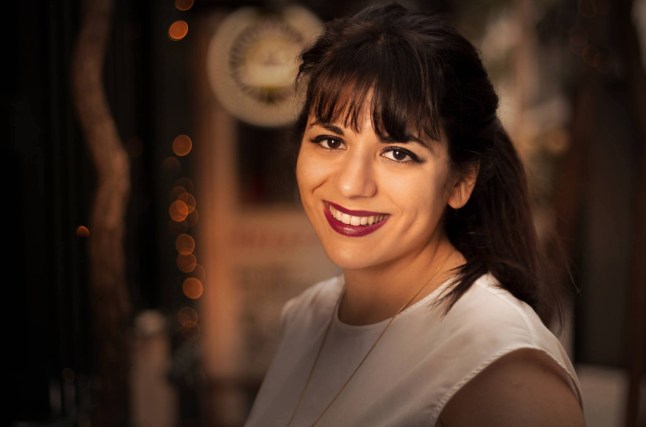
I couldn’t open up to people and show the ‘real me’ for fear that I’d be too vulnerable (Picture: Dimitra Staikou)
Narcissistic personality disorder (NPD).
When I first heard those words of diagnosis. I didn’t believe them.
It is a defined mental health condition, characterised by a need for admiration, lack of empathy and a grandiose sense of self-importance. Until my diagnosis in 2024, aged 33, everything I’d read about narcissists was negative: they trampled over others to get ahead, they were manipulative or duplicitous. I didn’t think I could be one.
But a year on, I feel a sense of relief.
As the only child of a wealthy family, born after many years of trying, I brought immediate joy to my parents. My father devoted himself to me, saying things like: ‘Dimitra, you are my whole world.’ I had everything I wanted – toys, gifts and trips – but above all, my parents’ undivided attention and love.
At high school, I was popular with lots of friends, but I can’t say I really bonded with anyone.
Looking back, this feels consistent with NPD: I couldn’t open up to people and show the ‘real me’ for fear that I’d be too vulnerable and lose control.
As I started exploring my sexuality, I’d change sexual partners without caring about their feelings.
As an adult, I continuously sought the admiration of others in the same way I’d always done with my parents. Instead of becoming a lawyer as I once thought I would, I studied theatre and became a director and writer so that my work could be admired. I loved the recognition.

I would fall into extreme sadness when things didn’t turn out the way I wanted (Picture: Dimitra Staikou)
Yet throughout it all, inside, I was fragile. I’d had a sense since childhood that my personal value was reliant on success.
That feeling had begun to take hold worse after my mother passed away when I was 19 – but the catalyst to seeing a psychiatrist was a series of crises. By my late twenties, I was unemployed, I had also lost my father due to Covid-19 complications, and I was going through a divorce, which left me struggling to raise twin boys.
I would fall into extreme sadness when things didn’t turn out the way I wanted. If one of my plays received even a single bad review, I’d cry alone for days at home. I found myself getting impatient when I didn’t get what I wanted and would stop seeing someone I was dating or any friend who gave me the slightest criticism.
Eventually, my cousin’s wife, a psychiatrist, suggested I seek professional help. I agreed, knowing something needed to change.
In my first session with my own psychiatrist, we simply talked. He listened as I finally expressed all my anger and sadness about how life was treating me. I told him how much my father meant to me, how vacant I felt without his support, and how upset I was about my divorce.

While narcissists can have a really big social circle, on the inside, they are extremely lonely (Picture: Dimitra Staikou)
During the second session, he asked me to fill out a long questionnaire. It asked whether I was an introvert or an extrovert – I am the latter – and how I felt about my self-image, to which I answered that I was very secure and open socially, yet hid my inner insecurities extremely well.
It wasn’t until our third session that my psychiatrist told me that I had NPD.
With so many friends in my life and children who I adored, I didn’t think I met the criteria of a narcissist.
Sensing my disbelief, my psychiatrist reassured me that all people have some narcissistic traits but people like me have them to such an extent that they can seriously affect their interpersonal relationships.
While narcissists can have a really big social circle, on the inside, they are extremely lonely, keeping all the important parts of their inner lives to themselves.
He told me that when narcissism is controlled, it gives people confidence to take risks and explore life. But when it’s out of hand, being unable to bond with others can lead to extreme loneliness.

I’m slowly starting to see a positive change (Picture: Dimitra Staikou)
My own narcissism made me extremely contradictory. I may have seemed confident, but I was deeply insecure and was never honest because I didn’t want others to see my weaknesses. It likely stemmed from my childhood: signs of NPD can start from an early age and may arise in people who were the centre of their parents’ world as children.
For treatment, I was prescribed 10mg of a drug called Brintellix to stabilise my mood swings, and Cognitive Behavioural Therapy (CBT) once a week, to try and help me develop more emotional intelligence towards others.
Then came the hard part of telling friends and family.
My cousin and his psychiatrist wife weren’t surprised – in fact, she had suspected it because of my behaviour over the years.
When I told two of my closest friends, they embraced me without making me feel ashamed, or like a social pariah.
They accepted me, and their reaction meant the world. It was the first time I’d had a genuinely strong, emotionally connected moment with my friends, and it wouldn’t have been possible without therapy.
One year on from my diagnosis, I’ve processed the initial shock and now feel relieved. For the first time in my life, I finally know who I am at my core.
I’m still seeing my psychiatrist, who gives me hypothetical situations happening to others and asks me to imagine how I would feel in the same scenario. He also encourages me to open up to people more.
I’m slowly starting to see a positive change. Once, a friend asked me to wake up in the middle of the night to buy medicine for her, which I did. I wanted to help her as I now understand more about how friends do things for each other.
In the past, I probably wouldn’t have bothered.
There are still times that I feel lonelier than ever and feel like withdrawing from people. But when this happens, I remember my psychiatrist’s words: ‘This disorder is a part of you. Beyond loneliness, it gives you ambition and success, and before you rush to blame it, think about what would remain of you if you removed it.’
It is who I am and I’m learning to live with it.
Do you have a story you’d like to share? Get in touch by emailing Ross.Mccafferty@metro.co.uk.
Share your views in the comments below.
Arrow
MORE: I was breastfeeding – then my baby stopped breathing
Arrow
MORE: Spanking queues and penis massage classes — My weekend at a sex retreat
Arrow
MORE: I’m an otrovert – here’s what that means
Comments
Add Metro as a Preferred Source on Google
Add as preferred source
Degrees of Separation
Join us each week as hear from the people going through familial estrangement, for worse and for better.
